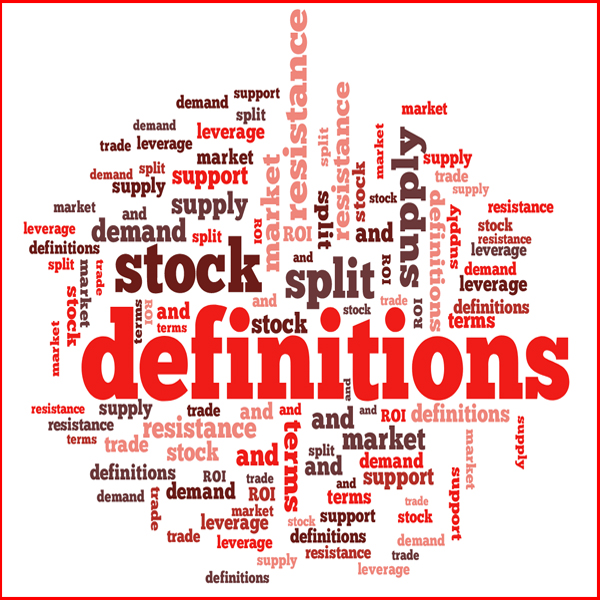Stock Terms and Definitions for Stock Market Investing
Stock terms and definitions will help you become familiar with the words and phrases commonly used in stock market investing. This is not a comprehensive list, but is continually added to in order to give you a one-stop location for all of your research.
Knowledge is key and knowing what the words you hear in every day investing helps you become more comfortable with stock market investing as a whole. There is an entire dictionary dedicated to stock terms and definitions. There are literally thousands of words in the investing world.
I'm not going to clutter my site with all of them since they are all over the web, but I will enlighten you on some of the more important stock terms and definitions you will hear all of the time.
The following stock terms and definitions will help you gain the leading edge in the markets and is a great destination to save for future research if you ever have questions.
Basic Stock Terms and Definitions
Analyst Consensus - A consensus is a combined estimate of of analysts who are researching a public company. Based on information they come up with, they generally issue a buy, hold, or sell assessment.
Asset - An asset is something tangible that has a cash value and can be converted to cash within a year. An asset is something such as property that will make you money after any associated liabilities are payed off. This is one of the most important stock terms and definitions if you are looking to build wealth.
Balance Sheet - A balance sheet is a financial accounting document provided from a company to the public explaining all of its assets, liabilities, and shareholder equity.
Bear Market - What is a bear market? A bear market is when a stock is trending downward and stock investors are cautious.
Blue Chip Stocks - Blue chip stocks are shares in a soundly established corporation with a great reputation (a household name) and is considered one of the top three companies within its trading sector.
Bull Market - What is a bull market? A bull market is when there is confidence in the market and people are buying stocks confidently.
Equities - Equities are shares of ownership in a particular company, the amount of which is calculated based on the company's balance sheet performance.
Insider Trading - Insider trading is a big no no in the stock market arena. It is the illegal buying or selling of stocks based on information obtained by privileged company information.
IPO - What is IPO?
An IPO is an initial public offering and is a period of time when a
stock is offered to the public when first traded publicly for a
predetermined price per share.
Liability - A liability is the opposite of an asset. It is a debt or debt carrying obligation that you or a company owes someone else. An example is when a business owns a warehouse and owes more than the warehouse is worth.
Market Correction - A market correction is when the prices of a stock or an entire sector of the market drops rapidly to "correct" a stock price where it should be. It is considered a rapid drop of at least 10% for a stock price usually after a brief upward swing in price.
Moving Average - What is moving average? A moving average is the average price of a stock over a period of time. Based on the amount of time considered between prices determines a different price average trend.
Over Bought - Over bought is a term used when a stock price becomes so expensive (for what it's worth), that shareholders want to sell it to make a profit. Usually these shareholders bought it when it was cheap and have now held on to it long enough to make a profit when they sell.
Over Sold - Over sold is a term used when a stock price becomes so cheap (for what it's worth), that shareholders want to buy it because it is so cheap. It's like if a product goes on sale at the store. Usually these shareholders want to buy in while the price is low so they can wait for it to go up and make a profit.
Resistance - Resistance is the high point at which a stock can reach based on price, supply, and demand of the stock. (See Supply for link to additional information).
Return on Investment - You may have heard "you want to make the most return on your investment", but do you really understand what that means? Return on Investment or ROI is how much money you make from the money you put into an investment. If you put little to no money into a major purchase and make twice as much money with a resale, then you double your ROI.
Shareholder Equity - Shareholder equity is the money attributable to its shareholders, otherwise known as its "net assets". This is because it is equivalent to a company's total assets less its liabilities.
Stock Chart - A stock chart is a very valuable tool for a stock investor that provides a price track of a stock over a period of time.
Stock Index - A stock index is a sort of thermometer for the market generally utilized by an investor to gauge how the stock market is trending as a whole. The NASDAQ, S&P 500, and Dow Jones Industrial Average are the commonly referred to examples of stock indexes.
Stock Market Crash - A stock market crash is a significant unanticipated drop in price across the board for most securities. A crash is a 10% drop or more from the high and generally takes about one to two days to stop sliding. After the crash, the market will continue to drop slowly until investors start gaining confidence again.
Stock Market Quote - A stock market quote is a snapshot of a stocks price and various other information at a given time. During the trading day, this information is regularly updated.
Stock Sectors - Stock sectors are smaller sections of a stock index that encompass a group of stocks that fit under that section. For example, all of the oil stocks are held in the Energy Sector.
Stock Split - A stock split is when the company want to increase or decrease the number of outstanding shares. There is no financial benefit to a split. The stock price adjusts to a value equal to the share split.
Stock Ticker - A stock ticker is a scrolling bar that steams stock price information throughout the trading period. At the bottom of a stock market TV channel, a stock ticker generally scrolls at the bottom of the screen with the current trading price of the stock and if it is up or down from the beginning of the trading day.
Stock Trend - A stock trend is the current direction a stock is leaning. A trend can be upward (price is rising), downward (stock price is falling), or flat (the average stock price is not changing up or down).
Stock Valuation - Stock valuation is a method using predetermined formulas to calculate the theoretical value of a company and their stock in the future markets.
Supply and Demand - Stocks, like any other thing for sale, are driven by the economy. Supply and demand play a vital role in where a stock price goes, whether they go high or low.
Support - Stock support is the opposite of resistance and is the low price a stock can reach based on price, supply, and demand.
Trading Leverage - Trading leverage is a powerful tool to help investors trade more with less personal investment.
The above stock terms and definitions are not the entire dictionary and only contain a few of the commonly used words you'll run across in stock investing. Visit a more thorough dictionary of stock terms and definitions for any other words you don't know the meaning to.
Please let me know if you don't see stock terms and definitions you are looking for and I will get them added as soon as possible.


New! Comments
Have your say about what you just read! Leave me a comment in the box below.